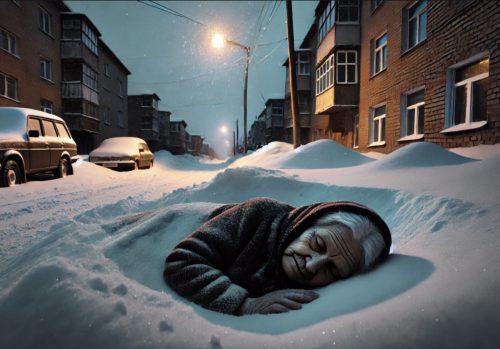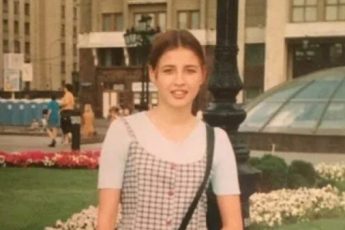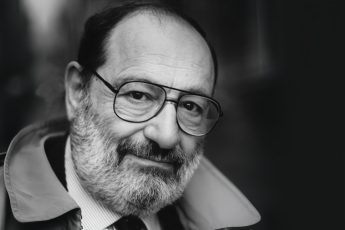Kostya trudged home after work, his frozen hands buried deep in his pockets. Snow was falling as if the sky had decided to dump everything at once—large flakes flew relentlessly, clinging to his eyelashes, slipping down his collar. The wind blew from all directions, lashing his cheeks until they had long since gone numb. His scarf had slipped to the side, and Kostya snorted, trying to adjust it.
“Some winter… damn it,” he muttered through clenched teeth, glancing around in search of at least some shelter from the storm. A thin film of snow covered his face, and it seemed that in just a little while, he would turn into one of those snow piles lining the sidewalk.
He had nearly reached his apartment entrance, his fingers already gripping his keys in his pocket, when suddenly, behind him, he heard a faint, almost inaudible voice:
“Help…”

Kostya froze. At first, he thought he had imagined it—who knows what the wind might carry. But something tugged at his chest. He turned, scanning the snow-covered, deserted courtyard—no one around. The snow stung his face, the trees creaked from the frost, and only a distant lamplight flickered dimly.
“Help…” the voice came again, a bit louder, but still barely audible.
Kostya felt a wave of anxiety rise inside him. He stepped aside, behind a tall snowdrift near the road, and what he saw made his heart clench.
Right there in the snow, almost entirely buried, lay an elderly woman. Her coat was far too light for the weather, and her hat had slipped, exposing her gray hair. Her face had turned pale, her lips blue from the cold, and her hands were clasped to her chest, as if trying to keep herself warm.
“Grandma!” Kostya rushed to her, dropping to his knees in the snow. “What happened? How did you get here?”
The old woman barely opened her eyes—exhaustion and pain glimmered in them.
“My leg… I think it’s broken…” she whispered, barely moving her lips.
Her voice was so weak he had to lean in close to hear. It was clear she had been lying there for quite some time, and the frost had done its work.
Wasting no time, Kostya pulled his phone from his pocket. His hands trembled, fingers clumsy, the screen slippery. He dialed 112 and pressed the phone tightly to his ear.
“Hello, ambulance? There’s an elderly woman here, I think she’s broken her leg and can’t get up. The address is…” he spoke quickly, glancing at her to make sure she was still conscious.
Looking around, he realized she wouldn’t warm up like that. Without hesitation, Kostya took off his jacket and gently draped it over her, trying to shield her as best he could. The snow immediately began to cover his sweater, but he didn’t care.
“Hold on, grandma. The ambulance is coming. It’s going to be alright, do you hear me?” he said gently, trying to reassure her.
The old woman gave a small nod, trying to smile through the pain.
The ambulance arrived surprisingly quickly. A white van with a red cross appeared around the corner, its headlights sweeping the courtyard, stopping on Kostya and the old woman.
A medic, a man around forty with a tired but attentive gaze, quickly approached, knelt down, and began examining her. His hands were confident and gentle.
“Looks like a fracture,” he said briefly. “She needs to go to the hospital.”
Kostya immediately stood up.
“I’ll go with you!” he said firmly, but the medic shook his head.
“Don’t worry, son, we’ve got this. You’ve already done more than enough.”
Kostya didn’t argue. He knew he’d just be in the way. He looked at the grandmother, now lying on the stretcher. She glanced back at him—her eyes filled with sincere, warm gratitude that words couldn’t express.
He waved to her, feeling a lump rise in his throat.
“You’ll be alright, grandma. You’re in good hands.”
The ambulance doors closed, and it slowly drove off, leaving tire tracks in the soft snow. Kostya remained standing in the empty courtyard, the cold seeping back in—but inside, a warm glow burned. Because sometimes, all it takes is stopping to help.
The next morning, Kostya sat in his kitchen, slowly sipping strong coffee. Snow still swirled outside, as if the night hadn’t ended. Cold light filtered through the curtains, casting a cozy dimness across the room that made it hard to want to leave.
He had nearly finished his sandwich when the phone rang. It buzzed on the table, making the spoon in his cup rattle softly. Kostya frowned—an unknown number. Usually, such calls brought nothing good: spam or work issues. But something told him to answer.
“Hello?”
“Is this Konstantin?” came a serious, slightly hoarse male voice.
Kostya was surprised. He didn’t recognize the voice and tensed slightly.
“Yes. Who is this?”
“This is a doctor from the hospital. You helped an elderly woman yesterday,” the man said calmly.
Kostya went silent for a moment, recalling the events of the day before. The image of the old woman flashed before his eyes—her pale face, blue lips, frozen hands.
“Yes, I remember,” he replied uncertainly.
“We thought you were her grandson,” the doctor continued. “She called you ‘my boy’ and held your hand while we drove her. She’s in the hospital now and needs a few things. Could you bring them?”
Kostya was taken aback. He had just helped—anyone would have done the same. But something stirred inside him. How could he say no?
“Alright,” Kostya sighed. “Tell me what she needs.”
The doctor listed off the items: slippers, a robe, warm socks, simple medications for support. Kostya quickly jotted everything down, thanked him, and hung up.
He sat for a while, staring into his now-cold cup. Thoughts swirled in his head: why me? But the old woman’s grateful eyes still lingered in his mind.
“Well, alright then…” he muttered and stood up.
He got ready quickly. Put on his coat, pulled on his hat, and went out. The frost tickled his cheeks but didn’t bite like it had the day before. He reached the store in ten minutes.
Choosing slippers, Kostya walked slowly, inspecting each pair. He picked the warmest ones, with a soft lining. Then he found a blue robe with a simple pattern, bought the medicine, double-checking the list several times to make sure he didn’t forget anything.
At the checkout, he paused by the cookie shelf. He grabbed a pack of «baked milk» cookies—the kind his grandmother used to buy. And a few mandarins—they smelled like the holidays.
“What if no one else helps her,” Kostya murmured quietly as he packed the items.
His soul felt a little lighter, as if he were doing something right, even if he didn’t fully understand why.
When Kostya entered the hospital room, his footsteps echoed off the cold walls. The room was small, dimly lit by light filtering through a dusty window, and everything smelled of antiseptic. On the snow-white bed, surrounded by this grayness, lay the same grandmother…
She was sitting up, propped on pillows, covered with a hospital blanket up to her waist. On a small bedside table stood a glass of water and a few blister packs of pills. When the door opened, the old woman raised her head, and her eyes immediately met Kostya’s.
Her eyes widened in surprise.
“It’s you… you came?” her voice trembled, as if she didn’t quite believe she was really seeing him.
Kostya smiled and scratched the back of his head, slightly awkward.
“Who else? Someone’s gotta help you.”
He stepped closer, carefully placed the bag on the nightstand, took out the slippers, robe, medicine, and neatly laid everything out. He left the cookies and mandarins where she could see them immediately.
“Here, grandma. Everything the doctor said to bring. And I got a few treats too. Good for tea.”
She looked at him, and her face changed instantly. Tears sparkled in her eyes, and she quietly sobbed, covering her mouth with a trembling hand.
“Thank you, son… No one cares about me,” she whispered, trying to hold back the tears, but they still rolled down her wrinkled cheeks.
Kostya sat down beside her, feeling something squeeze in his chest. She was just a stranger, but it felt like she was his own family.
“And your kids? Grandchildren?” he asked hesitantly, unsure whether to bring it up at all.
The old woman sighed heavily, slowly lowering her gaze to her hands, nervously fiddling with the blanket.
“They exist…” she began softly, emotionless. “But after I refused to sign the apartment papers, they stopped calling. They wanted to put everything in their names while I was still alive. And I… I just couldn’t. How can I be alive, and they already divided me up? So I ended up alone.”
A pang hit Kostya’s chest. He said nothing, not knowing what to say, but silence didn’t feel right either.
“You’re not alone anymore,” he finally said, placing a hand on her shoulder. “I’ll come visit. Don’t worry.”
The old woman looked up at him, eyes full of tears. In that gaze was everything: pain, gratitude, and a quiet but genuine hope that good people still existed.
“Thank you, child,” she whispered, squeezing his hand with her own calloused, warm fingers.
And in that moment, Kostya understood: sometimes fate brings people together for a reason.
From that day on, he visited the grandmother every day, like clockwork. After work, no matter how tired he was, he still stopped by the hospital. The cold outside had become routine, but the room always radiated a special warmth—both physical and emotional.
“So, grandma, how are we today?” he would ask with a smile as he peeked into the room.
Grandma Lida, as he now called her, sat wrapped in a blanket, her gray hair neatly combed, glasses on her nose, browsing an old button phone. In the corner, the TV hummed softly, playing some old movie.
“Just watching TV,” she’d reply, putting the phone aside and brightening as soon as she saw Kostya. “Don’t they scold you at work for visiting an old lady every day?” she’d joke, squinting playfully.
“They do,” he laughed, sitting down on the chair by her bed. “They say, ‘Kostya, what, got yourself a new grandma?’ And I tell them, ‘More than one!’”
She’d giggle, covering her mouth as if someone might overhear them.
They talked for hours. Kostya didn’t even notice how fast time flew. She’d tell stories from her youth—how she baked pies, how she and her husband went dancing, how they picked raspberries at their dacha, how she froze walking home from work in the winter. And he shared his life too—about his grumpy boss, the neighbor with a drum, and lonely evenings with the fridge as his conversation partner.
“Coming to see you feels like coming home,” Kostya said once.
“Well then, come by more often,” Lida winked. “It’s always homey here.”
She treated him to candy, and he joked that he’d lose his teeth. One day she said:
“You feel like family to me.”
Kostya smiled and squeezed her hand.
“That’s because I am. I’m yours now.”
A few weeks passed. The day came when Grandma Lida was to be discharged. Kostya had planned to come, but work got hectic—calls, reports, the boss with new demands. He looked at the clock—it was already evening, visiting hours long over.
At home, just as he took off his coat, his phone vibrated in his pocket. An unfamiliar number. Kostya answered.
“Is this Konstantin?” came the familiar hoarse voice.
“Yes. Who’s this?”
“This is from the hospital. Grandma Lida asked me to pass on a message.”
A text arrived. Kostya read:
“Thank you, Kostya, for your care and warmth. You restored my faith in people. I’ll be waiting for your visit like for family. Your Grandma Lida.”





